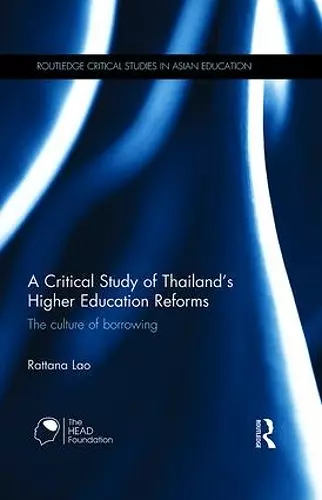A Critical Study of Thailand’s Higher Education Reforms
The culture of borrowing
Format:Hardback
Publisher:Taylor & Francis Ltd
Published:20th May '15
Currently unavailable, and unfortunately no date known when it will be back
This hardback is available in another edition too:
- Paperback£48.99(9781138575868)

This critical study explores Thailand's higher education reforms, analyzing the influence of global policies and historical contexts on the educational landscape.
This book provides a thorough analysis of the ongoing higher education reforms in Thailand, placing them within the larger framework of historical, socio-economic, and political transformations. By employing a qualitative case study approach that incorporates multiple methods of inquiry, it investigates the impact of various global education policies, such as quasi-privatisation, internationalization, and quality assessment (QA) on the Thai higher education landscape.
The narrative is rooted in the concepts of policy borrowing and lending, examining how the interplay of politics, economics, and cultural factors has influenced significant reforms in Thailand over the past century. It posits that the historical legacy, policy contexts, and belief systems held by policy elites are crucial in either promoting or hindering policy changes. While the historical analysis reveals that Thailand has consistently drawn from Western educational models, the persistent emphasis on 'Thai-ness' suggests a complex relationship with these borrowed ideas, often framed as a pursuit of independence and uniqueness.
A Critical Study of Thailand's Higher Education Reforms delves into critical areas such as selective borrowing, the impact of the Asian Economic Crisis on autonomous universities, the challenges of internationalizing teaching, and the emergence of quality policies. This comprehensive examination is intended for researchers and scholars in education, particularly those focused on educational policies in the context of tertiary education, as well as those specializing in Asian and Southeast Asian studies.
"Given the huge gap in the literature on Thai higher education and its reform, this new volume by the Thai scholar, Dr. Rattana Lao, makes a major contribution to both the fields of comparative higher education and Thai Studies. The book is based on rigorous well triangulated interdisciplinary research. It provides valuable insight and understanding into the nature of Thailand’s major higher education reform and related quality assurance innovation and how those policies have been influenced by powerful external global forces." Gerald W. Fry, Distinguished International Professor, Department of Organizational Development, Policy, and Development, College of Education and Human Development, University of Minnesota
Although it focuses on the education sector, the book could be described as an exploration of Thailand’s political, economic and cultural relationship with the West. In [the author's] own words, it ‘offers the possibility of using the field of education as a site to theorize the logic and structure of the Thai state’ (p. 188). ... The final chapter in particular generates themes that are pertinent to current debates internationally, such as the impact of marketization on the quality of education. It would be helpful to see what alternative theoretical attacks on the subject might produce. How might a sociological line of investigation be relevant here? How can theories of education as reproduction of power (Bourdieau, 1990) and academic capitalism (Slaughter and Leslie, 1997) be used to better understand the interplay between education and power in Thailand? And what do alternative theoretical perspectives on the nature of the state and Thai politics suggest? This book has certainly opened up a space to have these types of interdisciplinary conversations. -- Elisa Brewis, UCL Institute of Education, University of London in ASEASUK News 58 (2015)
"This book has the potential to begin a more candid conversation about the past, present, and future of Thai higher education policy. The case study research methodology is an effective way of contributing to knowledge in this area, and one hopes this book spurs on more empirical research. ... Still, despite Lao's admission that this book is not exhaustive, it is by far the most comprehensive understanding of Thai higher education in English print today, and its contribution to knowledge will have significant implications for understanding the future role of Thai higher education in the politics, economics, and culture of Thailand." -- Oliver S. Crocco, George Washington University, in Journal of International and Comparative Education, 2016, Volume 5, Issue 1
"Considering that there is very little English literature on reform in Thailand’s higher education system, this book can be rated as one of the most comprehensive commentaries on the subject. The major strength of this book lies in its detailed historical account of the Thai higher education system. The book picks up key policy innovations and attempts to rationalize the policy reforms by integrating national, regional and global contexts into its main theoretical premise of policy borrowing. The book is strengthened by the author’s access to key policymakers and leading technocrats whos accounts and opinions regarding the development of higher education are informative and reliable sources of information. " - Nopraenue Sajjarax Dhirathity, Mahidol University, The Journal of Southeast Asian Economies,, Vol. 33, no. 2 (Aug 2016) (Singapore: ISEAS–Yusof Ishak Institute, 2016)
ISBN: 9781138022683
Dimensions: unknown
Weight: 453g
230 pages